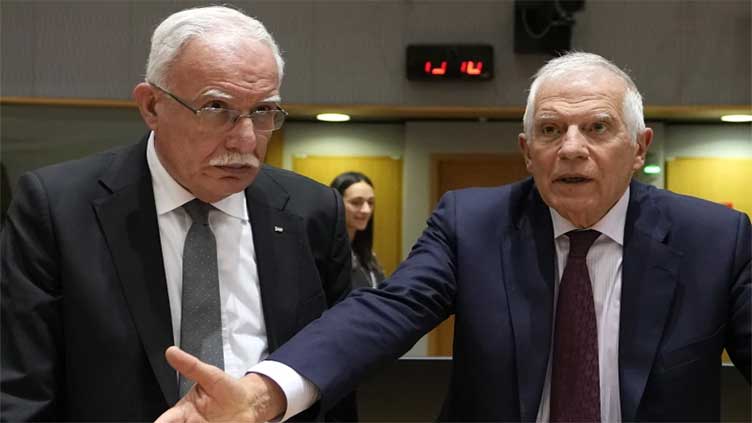European Union overcame Hungary veto's threat to seal a 50 billion-euro aid package for Ukraine

World
European Union overcame Hungary veto’s threat to seal a 50 billion-euro aid package for Ukraine
BRUSSELS (AP) — The leaders of the 27 European Union countries sealed a deal on Thursday to provide Ukraine with a new 50 billion-euro ($54 billion) support package for its war-ravaged economy after Hungary backed down from its threats to veto the move.
European Council President Charles Michel announced the agreement that was reached in the first hour of a summit that he was chairing in Brussels.
“We have a deal,” Michel said in a post on X, formerly known as Twitter. He said the agreement “locks in steadfast, long-term, predictable funding for Ukraine,” and demonstrated that the “EU is taking leadership and responsibility in support for Ukraine; we know what is at stake.”
Ukrainian President Volodymyr Zelenskyy welcomed it as a “very important” decision. His country could receive the first tranche of funds as soon as March, once the European Parliament has endorsed the deal.
That Hungary lifted its veto, and so quickly, came as a surprise.
Hungarian Prime Minister Viktor Orbán raised staunch objections to the financial aid package in December and blocked its adoption, and he had threatened to do the same in recent days. The populist leader’s government has been in a dispute with the European Commission, the EU’s executive branch, over Hungary’s alleged democratic backsliding and had some of its own funding withheld as a result.
In December, the 26 other leaders agreed that the $54-billion package would run from 2024 through 2027. They also agreed to make Ukraine a candidate for EU membership, which Orbán reluctantly accepted.
But the financial package was part of a review of the EU’s continuing seven-year budget, which requires unanimous approval.
An EU official, who asked not to be named because the summit was ongoing, said that the leaders agreed that the commission would propose a review of the budget in two years, if deemed necessary. Such a review wouldn’t include an opportunity for a future veto, the official added.
The outline of a deal was drawn up on the eve of the summit when a few leaders, including Michel, German Chancellor Olaf Scholz and Dutch Prime Minister Mark Rutte met with Orbán to test out some options for overcoming the Hungarian veto.
The results of those talks allowed diplomats to work into the night to streamline the final wording of the agreement, the official said. The breakthrough came at another small-group meeting early Thursday, when Orbán sat together with Scholz, Michel, French President Emmanuel Macron, Italian Premier Giorgia Meloni and European Commission President Ursula von der Leyen.
After a delay of about an hour, Michel convened the summit, and a deal that had been expected to take several hours to wrap up was clinched in just minutes. It remains unclear whether Orbán had won any concessions on obtaining frozen EU funds.
Orbán cast the decision as a victory, saying in a video on Facebook that a review mechanism attached to the funding package would “guarantee the rational use of the funds,” and that EU money being denied to Budapest wouldn’t be spent on Ukraine.
“We were afraid that the EU money owed to Hungarians which the commission has not given us yet would sooner or later end up in Ukraine,” he said. “We received a guarantee that Hungary’s money would not be transferred to Ukraine.”
Almost two years after Russia launched a full-scale invasion of Ukraine on Feb. 24, 2022, the war has ground to a halt, and Ukraine’s economy desperately needs propping up. But political infighting in the EU and in the United States has held up a long-term source of funding.
“Continued EU financial support for Ukraine will strengthen long-term economic and financial stability, which is no less important than military assistance and sanctions pressure on Russia,” Zelenskyy tweeted, welcoming the news.
On the way into their meeting, some leaders lashed out at Orbán, accusing the Hungarian leader of blackmail and playing political games. Concern has mounted that public support to keep pouring money into Ukraine has started to wane, even though a Russian victory could threaten security across Europe.
“There is no problem with the so-called Ukraine fatigue issue. We have Orbán fatigue now in Brussels,” Polish Prime Minister Donald Tusk told reporters. “I can’t understand. I can’t accept this very strange and very egoistic game of Viktor Orbán.”
Orbán, the EU leader with the closest ties to Russia, is angry at the European Commission’s decision to freeze his government’s access to billions of euros in joint funding.
In response, Hungary has vetoed statements at the EU on a range of issues. Orbán exported the problem to NATO, by blocking high level meetings with Ukraine until only recently. Budapest is also holding up Sweden’s bid for membership in the trans-Atlantic military alliance.
“I don’t want to use the word blackmail, but I don’t know what other better word” might fit, Estonian Prime Minister Kaja Kallas told reporters as she arrived at EU headquarters.
“Hungary needs Europe,” she said, highlighting the country’s own economic problems and high interest rates. “He should also look into what is in it for Hungary, being in Europe.”
Tusk insisted that there could be “no room for compromise on our principles, like rule of law. And for sure there is no room for compromise on the Ukraine question.” The recently elected Polish leader added of Orbán: “If his position will dominate in Europe, then Ukraine will lose for sure.”
In the end, most of the leaders flew to Brussels from across Europe to address an issue that was resolved within minutes.


